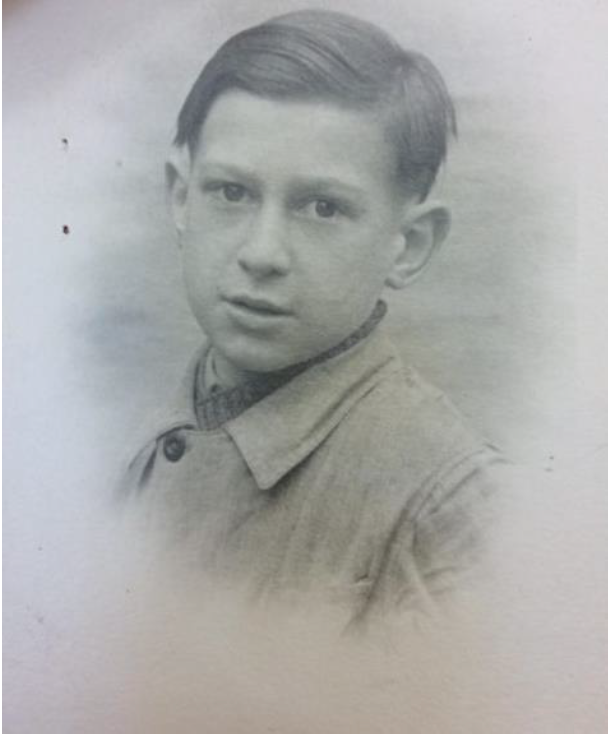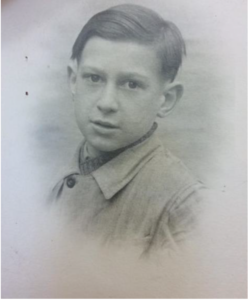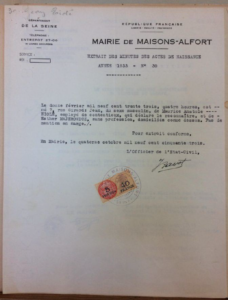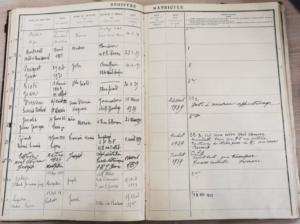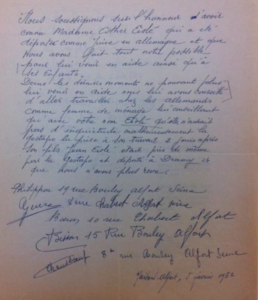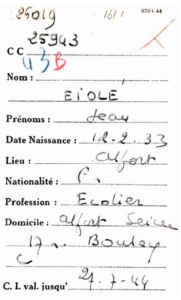Jean EIOLÉ
This biography was written by a group of 9th grade students from the Nicolas de Staël secondary school in Maisons-Alfort, in the Val-de-Marne department of France, during the 2023-2024 school year: Nejjari Nouaim; Cau-Gourdon Valentin; Ferreira Adrien; Garcette Gabrielle; Gatabazi Nuru; Leroy Morgane; Bousson Alexandre; Sandrolini Léna; Srour Raphaël; Catel-Martin Julia; Vlei Camélia; Manot Rémi; Cadoz Thomas; Ogé Aurélien; Gulia-Degomme Maxence. The students were supervised by Adrien Roso, their history and geography teacher.
We began researching the lives of two people who were deported on Convoy 77 in January 2024. This convoy, which left Drancy camp on July 31, 1944, was the last major transport of Jews to the Auchswitz-Birkenau killing center in Poland. We then put pen to paper to write the biographies of Esther Eiolé and her son Jean Eiolé, who were living in Maisons-Alfort when they were arrested in late July 1944. Esther survived and returned home, while Jean died shortly after he was deported.
We first took the opportunity to familiarize ourselves with various types of records from a range of different sources, which gave us a better understanding of the way in which real historians work. Since we live and go to school in the town where Esther and Jean lived, we were then able to take a micro-historical approach as we researched the tragic story of two lives that were shattered by the horrors of war and anti-Semitism. As we did so, we also broadened our overall knowledge of the Nazi concentration camp system. One of the things we liked about this project was that we were carrying out a real “investigation”, finding out about Esther and Jean’s lives a little at a time, as we received the archived material. The project really brought home to us the fact that the genocide that we study in class claimed the lives of so many men, women and children who, before the war, all led normal lives, with day-to-day problems, hopes and dreams.
We would especially like to thank Françoise and Jean Jakubowiez, Esther’s grandchildren, for their help and the invaluable documents they shared with us.
We (especially our teacher) would also like to thank Claire Podetti for her outstanding assistance in searching the archives.
Picture postcard featuring Jean Eiolé.
Source: File on Jean Eiolé, Victims of Contemporary Conflicts Archives Division of the Ministry of Defense Historical Service, in Caen, dossier 21P4471348202
Jean Eiolé was born at 4 a.m. on February 12, 1933 at 7 rue Girard in Maisons-Alfort.
Jean Eiolé’s birth certificate, dated 1933
Source: File on Jean Eiolé, Victims of Contemporary Conflicts Archives Division of the Ministry of Defense Historical Service, in Caen, dossier 21P4471348202
Maurice Eiolé, who was born on September 25, 1896 in Bracieux, in the Loir-et-Cher department of France, was a litigation clerk who had previously been married to a woman called Isabelle Robert. He appears to have been a staunch Republican and/or Communist. This is borne out by the fact that he went to fight with the International Brigade in Spain against Franco’s supporters on August 29, 1936. It is unclear exactly when Maurice Eiolé died: some sources say that he died on the front line during the Battle of Jarama on November 13, 19361, while others say he died on February 7, 1937.
Jean had three older half-brothers: Léon, Joseph and Jacques Jackubowicz, who his mother Esther had during her first marriage to a Polish man, Kiva Jackubowicz.
On February 20, 1939, Jean started school at the Paul Bert elementary school in Maisons-Alfort. He was six years old at the time, and living at 7 rue Girard.
School register kept by the teachers at the Paul Bert elementary school in Maisons-Alfort
Source: Val-de-Marne departmental archives
The Gestapo arrested Jean Eiolé, who was 11 years old at the time, at the home of his mother’s partner, François-Xavier Ruffieux. He was arrested because his mother had refused to tell the Germans where to find her older sons. However. the exact date on which he was arrested is unclear. According to a neighbor, Julien Philippon, he was arrested about a week before his mother, while according to Esther’s letter, he was arrested at the same time as her on July 25, 1944. However, several other sources, such as the Drancy camp records, François-Xavier Ruffieux’s statement and a letter from another neighbor, Mrs. Zimmerman, who was there at the time, all give the date as July 27.
Neighbors’ sworn statement about the circumstances in which Esther and Jean were arrested. Source: File on Jean Eiolé, Victims of Contemporary Conflicts Archives Division of the Ministry of Defense Historical Service, in Caen, dossier 21P4471348202
Jean was interned, together with is mother, on July 27, 1944. They were put in room 16.1, which was in dormitory 3 on staircase 4. The letter “B”, written in red ink, meant that he was “deportable” immediately. He was assigned prisoner number 26,019.
Jean’s interment card, from the Drancy camp transfer register
Source: Shoah Memorial / French national archives
Jean Eiolé died either on the journey to Auschwitz or in the camp itself, soon after he arrived. His official date of death was later declared to be August 5, 1944.
He was later officially recognized as having been a “racial hostage” and a “non-returned” deportee, which effectively meant that he was dead. He was officially declared “disappeared” on February 12, 1954, ten years after he died.
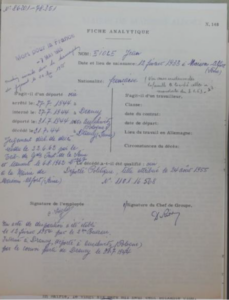
Source: File on Jean Eiolé, Victims of Contemporary Conflicts Archives Division of the Ministry of Defense Historical Service, in Caen, dossier 21P4471348202
After the Red Army liberated the Auschwitz camp on May 8, 1945, Jean’s mother, Esther, was repatriated to France. She then set about requesting “political deportee” status for herself and her son. Jean was granted it first, together with the right to have the words “Died for France” added to his death certificate, on August 24, 1955.
LINKS:


 Français
Français Polski
Polski